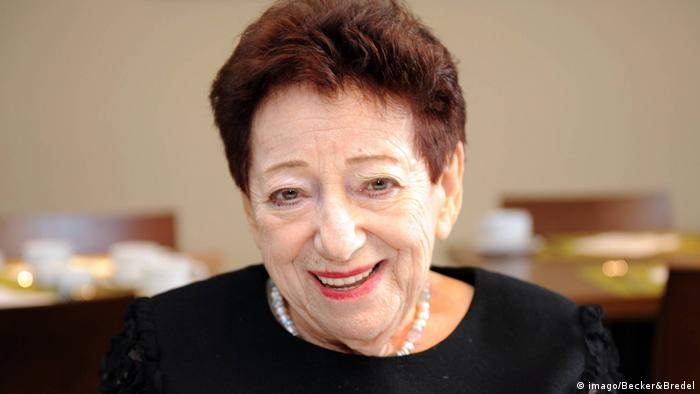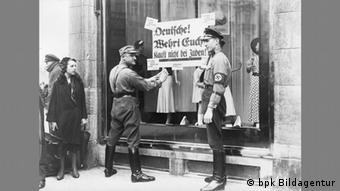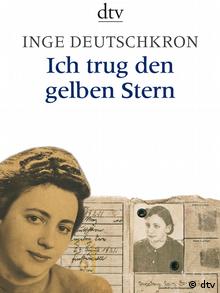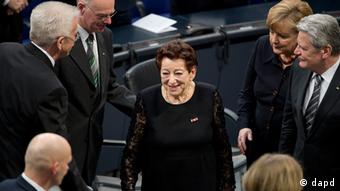The German-Israeli publicist is 95 years old. As one of 1700 Jews survived the Holocaust in the Berlin underground. Until today, you will not be tired to remind of the crimes of the Nazis.

Journalist and author Inge Deutschkron
“My child, from now on, you Jew.” Only ten years old, Inge Deutschkron 1933 learns from her mother that her family is Jewish. “We were not at all religious,” recalls Deutschkron, but that interested the Nazis. After the seizure of power she was called suddenly by her classmates as a “dirty Jewess” – to the end of the war a distressing ordeal of fear and persecution followed.

“Don’t buy from Jews!” Shop window in Berlin in 1933
Inge Deutschkron and her parents are among the 1,700 Berlin Jews who survived the systematic destruction in hiding. First of all, by the courage and strength of will: “don’t you like anything. If someone attacks, defend yourself!”, to Inges have to tell mother right at the beginning of the persecution of the Jews to her – a phrase that characterizes the 95-Year-old today.
After all the Jews had to leave their homes and into crowded, so-called Jews ‘ houses of life, broke out on the young Inge sometimes. “I simply couldn’t stand it,” she recalls, then picked up her jacket with a yellow Jewish star, took on a more without. In a dark hallway, she moved secretly her clothes and went to the Theater, which was forbidden to Jews at that time. A dangerous business, after all, you would be able to be detected. “The theatre visits have meant much to me. Once for two hours about something else can think…”
Leaflets against Hitler
Until 1943, the girl found the protection and support of Otto Weidt. The owner of a workshop for the Blind, employees of Inge Deutschkron, and many other Jews, who he saves from Deportation to concentration camps. Deutschkrons father had emigrated at the time to England. Already in the Reich crystal night in 1938, the Gestapo had searched for the avowed social Democrats. “As a child, I’ve folded with my parents leaflets against Hitler,” says Inge Deutschkron. “My parents have explained to me exactly why you got involved politically. I went with them often to demonstrations.” Her father had always felt as a German, wanted to get away under any circumstances. However, when the Gestapo started looking for him, he fled, eventually to be Known to England – his wife and child should the offspring, but it came only after the end of the war.

Track 17: memorial at Berlin’s Grunewald train station, departure earlier station of the deportation trains
Mother and daughter experienced during its monthly deportations. The first was it was a relief that it was this time. Then the fear came quickly: We could be next! Non-Jewish friends urged the two to finally go underground. “They could not endure this barbarism and risked their lives to save ours,” said Deutschkron in the DW-interview. “Silent heroes” is called the helper until today, about their courage from their point of view in the post-war period, far too little is spoken.

The timeless autobiography of Inge Deutschkron, 1978
Against Forgetting
And that is exactly what has made the feisty lady life’s mission. Not plaintively, but quite an admonition, you will not be tired to remind of the crimes of the national socialists – with 95 years. “I wore a yellow star” is the name of one of her twelve books, the later as a theater piece, under the title “Starting today, your name is Sarah” in the renowned children and youth theatre GRIPS in Berlin. Again and again she speaks in front of school classes. Their message: “may It never happen again. To do this, you must know what happened, and who were the criminals. The ‘how’ and the ‘why’ comes to me nowadays, still too short,” said Inge Deutschkron in 2016, in a television interview with the Bavarian radio.
“I must have been crazy that I have to keep this for so long,” says the publicist about your early years. After the war, you and your mother were gone to the father to England, in 1955, she returned to Germany to work from Bonn as a correspondent for the daily newspaper “Maariw”. “No one was interested in what I had to report – on the contrary!”. Frightened, she had to find that to be found in the Bonn Republic still everywhere the Nazis were in every office, in every authority, and also in the parties. “You said to me: ‘Oh, forget it! It is so long!’”
Collective Memory

Emotional appearance: Inge Deutschkron in the Bundestag in 2013
Your tenacity and your justice will have paid off. Now if you listen to her long ago – even in the Bundestag. In 2013, the writer described their experiences on the occasion of a remembrance ceremony for the victims of national socialism. “It is so difficult for me, because it was the first Time in front of such a large and important body. And at the beginning I thought there must be something wrong – it was not so quiet, as I knew it in the past.” Then, you learned that the present politicians and guests of honour were simply affected by their portrayals.
Inge Deutschkron is part of the collective memory in Germany. To report to their open nature about the atrocities, keeping up the memories. She is co-founder of the silent heroes memorial center, which you owe your life to, started their own “Inge Deutschkron Foundation” to the mediation of the Nazi crimes in the teaching of history and was filming part of two historical documentary. Furthermore, she is in Berlin, where she lives after an extended stay in Tel Aviv since 2001, for a lively culture of remembrance. As you demonstrated at the beginning of the year, for example, against the demolition of a Villa in Fontane promenade, now a modern residential and office complex. In the national socialism, this was called “bullying promenade”, as the “Central body for the Jews” was established, the 26,000 Jews in Berlin in the forced labour sent.
The German-Israeli writer has won several awards, including the Moses-Mendelssohn-prize in 1992, and the order of merit of the Federal state of Berlin in 2004. A price has rejected you several times: the Federal cross of merit. As had been acknowledged in the 1950s, to the national socialists.